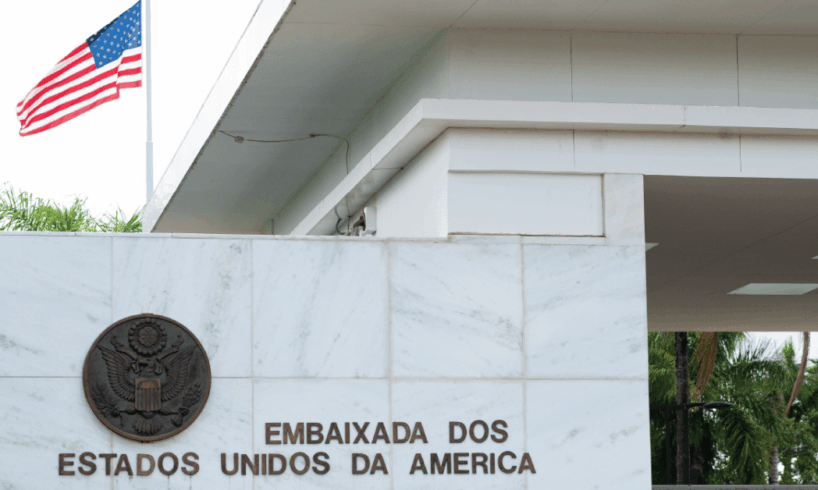
The U.S Embassy in Brasilia, Brazil, in 2020. (Andressa Anholete/Getty Images)
As the United States and China compete for influence on the world stage – and particularly in middle-income countries – many people in nine such countries see problems in their relationships with these superpowers. In some places, more say problems with U.S. relations are very serious for their country than say the same about problems related to China, according to a Pew Research Center survey of more than 12,000 adults.
The survey was conducted Jan. 8-April 21, 2025, in Argentina, Brazil, India, Indonesia, Kenya, Mexico, Nigeria, South Africa and Turkey. These nations are all classified as middle-income by World Bank.
How we did this
This Pew Research Center analysis focuses on views of bilateral relations with the U.S. and China in nine middle-income countries.
The data comes from nationally representative surveys of 12,375 adults conducted Jan. 8-April 21, 2025. All surveys were conducted face-to-face in Argentina, Brazil, India, Indonesia, Kenya, Mexico, Nigeria, South Africa and Turkey.
Here are the questions used for this analysis, along with responses, and its methodology.
Views of issues with U.S. relations
We asked respondents about five political and economic issues related to the U.S. that might affect their country. Majorities in most of the nations surveyed describe each of these issues as at least somewhat serious. And substantial shares consider some of them very serious.
People are most likely to say the amount of debt their country owes to the U.S. is a very serious problem, with a median of 59% holding this view.
In Brazil and Kenya, 68% majorities say the amount of debt their country owes the U.S. is a very serious problem.
What is a median?
In this analysis, median scores are used to help readers see overall patterns in the data. The median percentage is the middle number in a list of all percentages sorted from highest to lowest.
In seven countries, around four-in-ten adults or more describe U.S. involvement in their nation’s politics as a very serious problem. Around half hold this opinion in Brazil, Indonesia and Turkey.
A median of 43% describe U.S. military power as a very serious problem for their country, while a median of 40% say the same about economic competition with the U.S.
Respondents are least likely to describe U.S. human rights policies as a very serious problem for their country, with a median of 32% taking this stance.
Adults in India tend to show the lowest concern for these issues: 31% say India’s debt to the U.S. is a very serious problem, and around one-in-five describe each of the other issues this way.
Is U.S. investment a good thing or bad thing?
We also asked about the domestic impact of investment from the U.S.
Nearly three-quarters of Kenyans say investment from the U.S. is a good thing because it creates jobs in their country. Majorities in Nigeria (66%) and India (59%) agree. Smaller shares say this in Brazil and South Africa, but adults in both countries are still more likely to describe such investment as good than bad.
On the other hand, 56% of Indonesians say U.S. investment is a bad thing because it gives the U.S. too much influence over their domestic affairs. Respondents in Turkey and Argentina are also more likely to describe U.S. investment negatively than positively.
Adults in Mexico are roughly divided on the impact of U.S. investment.
In most countries surveyed, people who say economic competition with the U.S. is a very serious problem are more likely to say U.S. investment is a bad thing. For example, 67% of Argentines who view this economic competition as a very serious problem have a negative view of U.S. investment, compared with 46% of those who are less concerned.
How views of U.S. issues compare with views of Chinese issues
In addition, we asked people about the same set of problems as they relate to China and Chinese investment in their country.
Adults in Mexico, South Africa and Turkey are more likely to describe every problem as very serious when it comes to the U.S. than when it comes to China. Larger shares in these countries also say investment from China is a good thing compared with the shares who say this about investment from the U.S.
For example, 48% of Turks describe U.S. involvement in Turkey’s politics as a very serious problem, compared with 18% who say this about Chinese involvement.
Indians, on the other hand, are more likely to identify each problem as very serious in the context of relations with China. They are also far more likely to approve of U.S. investment in their country than Chinese investment (59% vs. 33%).
As with the questions about the U.S., people who say economic competition with China is a very serious problem are generally more likely to see Chinese investment as a bad thing. About half of Mexicans who say economic competition with China is a very serious problem see Chinese investment in their country as a negative force, compared with a quarter among those who are less concerned about this economic competition.
For more on views of these issues with the U.S. and China in middle-income countries, refer to Appendix B in our recent report on global views of China.
Note: Here are the questions used for this analysis, along with responses, and its methodology.





